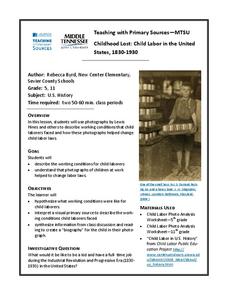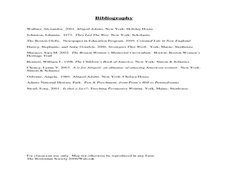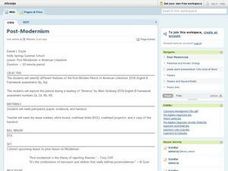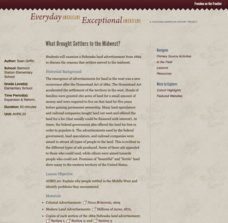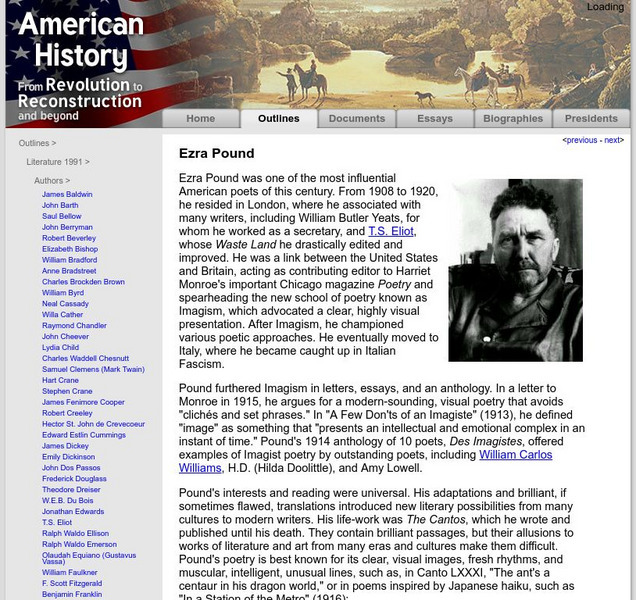Core Knowledge Foundation
Unit 6: American Revolution
The American Revolution is the theme of a five-week unit that focuses on reading, grammar, morphology, and writing. Scholars read and respond to texts, practice spelling and word work, and write paragraphs. Assessments gauge comprehension.
Curated OER
Childhood Lost: Child Labor in the United States, 1830-1930
Working in groups, middle and high schoolers describe and discuss photographs depicting working conditions experienced by child laborers in the 19th century. They then write a persuasive paragraph supporting an amendment to regulate the...
Curated OER
Abigail Adams: Integrating Social Studies and Language Arts
Third graders increase reading strategies while learning about Abigail Adams and her role in history. In this Abigail Adams lesson, 3rd graders read about the American Revolution and Abigail Adams using all the balanced literacy...
Orlando Shakes
Les Misérables: Study Guide
A writer has the responsibility to defend the less fortunate members of society. At least that was the view of Victor Hugo, author of Les Miserables. The novel is the subject of a study guide from Orlando Shakespeare Theater....
Ford's Theatre
How Perspective Shapes Understanding of History
The Boston Massacre may be an iconic event in American history, but perhaps the British soldiers had another point of view. Using primary sources, including reports from Boston newspapers and secondary sources from the British...
Curated OER
My Brother Sam is Dead: A study of the Revolutionary War
Fifth graders complete an analysis of the Revolutionary War through literature. After "My Brother Sam Is Dead," students create a time capsule containing items that would be relevant during the Revolutionary War. They identify key...
Curated OER
What Happened After (Or Before) That?
For this American history worksheet, students read two information texts about the White House and the Alamo. Students answer a multiple choice sequencing question about each text.
Curated OER
Post- Modernism
Learners participate in a lesson that investigates post-modernism in American literature. They conduct the lesson with the help of reading "America" by Ginsberg to create context. Then students define the genre and the culture that has...
Roy Rosenzweig Center for History and New Media
What Brought Settlers to the Midwest?
Drawn by promises of fertile land, thousands of settlers poured West because of the Homestead Act of 1862. By examining images of the ads that drew them westward, learners consider the motivations for movement. They also consider how the...
Curated OER
Revolutionary War Word Search
In this word search worksheet, young scholars use the word bank to find the names of battles of the Revolutionary War. Students find 24 words.
Curated OER
Wildcat Dumping Site
Students research facts about illegal dumping sites and write an editorial exposing the effects of the site from their point of view and persuades readers to take action. Students brainstorm ideas that could be included in the editorial,...
W. W. Norton
W. W. Norton & Company: Norton Anthology: Introduction to the Romantic Period
The major Romantic poets cannot be understood, historically, without an awareness of the extent to which their distinctive concepts, plots, forms, and imagery were shaped first by the promise, then by the tragedy, of the French...
W. W. Norton
W. W. Norton & Company: Norton Anthology: Victorian Age Topics in Literature
This resource discusses four controversies that concerned the Victorians: evolution, industrialism, what the Victorians called "The Woman Question," and Great Britain's identity as an imperial power. Includes multiple-choice quiz and...
University of Groningen
American History: Outlines: Imagist Ezra Pound
This site from the University of Groningen provides a good exposition of the well known imagist poet, Ezra Pound. Includes links to T.S. Eliot and W. C. Williams.
PBS
Kqed: Russian American Immigration
A historic look at the earliest wave of Russian immigration to the United States, which began in the late nineteenth century and continued up to the passage of restrictive immigration laws in the 1920s. With details about how World War I...

